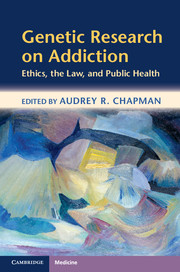Book contents
- Frontmatter
- Contents
- Contributors
- Preface
- Section 1 Introduction
- Section 2 Research ethics
- Section 3 Translating addiction research
- 11 The public health implications of genetic research on addiction
- 12 Genetics, addiction, and stigma
- 13 Lay beliefs about genetic influences on the development of alcoholism: Implications for prevention
- 14 Personalizing risk: How behavior genetics research into addiction makes the political personal
- Section 4 Conclusions
- Index
- References
11 - The public health implications of genetic research on addiction
from Section 3 - Translating addiction research
Published online by Cambridge University Press: 05 September 2012
- Frontmatter
- Contents
- Contributors
- Preface
- Section 1 Introduction
- Section 2 Research ethics
- Section 3 Translating addiction research
- 11 The public health implications of genetic research on addiction
- 12 Genetics, addiction, and stigma
- 13 Lay beliefs about genetic influences on the development of alcoholism: Implications for prevention
- 14 Personalizing risk: How behavior genetics research into addiction makes the political personal
- Section 4 Conclusions
- Index
- References
Summary
Introduction
Genetic research has identified a number of genetic variants that are believed to increase the risk of developing addictive disorders or predict responses to treatments for these disorders (see Chapter 2 of this volume for a review of the genetic research on alcohol dependence). This research has the potential to enhance public health through improved prevention and treatment of addiction. Predictive genetic screening might be used to identify persons at a greater risk of developing addiction and prevent them from doing so. Pharmacogenetic research may enable clinicians to better match persons with addictive disorders to more effective treatments, thereby minimizing side effects and relapse.
As well as having the potential to improve public health, research identifying genes predictive of addiction liability and treatment response may also be misused or misinterpreted in ways that harm individual and population health. It may negatively influence community attitudes to persons with a genetic predisposition to addiction, resulting in stigmatization of such individuals (Berghmans et al., 2009). Individuals may interpret genetic risk information in a deterministic way and believe they are powerless to change their behavior or their risk of addiction. Genetic risk information about addiction liability may also be used in a discriminatory way by employers or insurance companies (Taylor et al., 2008). Alcohol and tobacco industries may misuse this research to discourage population-level interventions aimed at reducing hazardous alcohol consumption and increasing smoking cessation (Gundle et al., 2010; Miller et al., 2012).
- Type
- Chapter
- Information
- Genetic Research on AddictionEthics, the Law, and Public Health, pp. 155 - 173Publisher: Cambridge University PressPrint publication year: 2012

